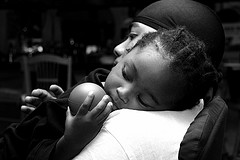
When the dust settled a young mother, Miriam Carey, was dead and we were left bewildered trying to understand what happened, what could have possibly set this woman off on this journey.
As the police sift through the information surrounding Carey, what is emerging is the image of a woman who may have been dealing with a severe postpartum mood disorder. It is not a coincidence that most of her friends and family were unaware, since postpartum depression and postpartum mood disorders are the most under-recognized complications of pregnancy.
The prevalence of postpartum depression is estimated to be about 10-20 percent while some of the more severe postpartum mood disorders, such as postpartum psychosis, have an incidence of less than 1 percent even though patients with severe postpartum mood disorders tend to make the news.
The vast majority of women in the U.S. are not diagnosed or treated for postpartum mood disorders, although they are at higher risk for other psychiatric disorders.
Most women will experience the “baby blues” immediately postpartum, i.e. first six weeks after delivery. Unlike postpartum depression, the “baby blues” is self limited and is likely a stress response related to sleep deprivation and hormonal changes that take place after having a baby.
Sufferers of postpartum depression are defined as having as least five of the following symptoms: depressed mood, loss of interest or pleasure in most activities, significant weight or appetite change, insomnia or hypersomnia, loss of energy or fatigue, feeling of worthlessness or excessive guilt, diminished ability to concentrate and recurrent suicidal thoughts. These symptoms must be present daily for at least two weeks.
There are validated screening tools available to identify those mothers who are dealing with more than the “baby blues,” however New Jersey is the only state that currently mandates screening for postpartum depression. In spite of the fact that early detection is key, postpartum depression often goes unrecognized.
Barriers to screening include: clinicians’ lack of awareness of screening tools, clinician’s perception that screening may be too time consuming, uncertainty about how to assist and treat a woman who has a positive screen for postpartum depression and issues related to reimbursement. Whereas barriers to detection include: women won’t admit negative feelings, professionals don’t ask the right questions or any questions, women don’t want to be stigmatized.
Studies show that postpartum depression has significant effect on children’s cognitive, emotional development and behavioral development, including social play at school. Responsible screening should be done at the first postnatal contact using appropriate diagnostic tool, and include rapid and early intervention with appropriate referral and mobilization of a support network for the mother diagnosed with postpartum depression. Women should be encouraged to discuss any feelings they have regarding their pregnancy and their new mom status with their providers and their support systems.
Tisha Rowe, MD, MBA
~The AB Doctor


